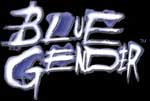
by Bill Alexander
In 2031 Kaidou Yuji awakens from his 22-year cryogenic sleep to a frightening image. Sealed in a tube in a medical cold-sleep warehouse -- an indefinite home for the terminally ill -- Yuji is revived not by a group of stoic doctors and tearful family members, but by a mysterious group of masked soldiers that have come to rescue him. The Earth has been infested with giant bug-like creatures known as the "Blue," monsters which toppled civilization's greatest architectural achievements like card houses and devoured nearly all living things. From this oversized human refrigerator where Yuji's been on ice for two decades, they pluck a few chilled cadavers for their menu. While "Blue Gender" bears some resemblance to Paul Verhoeven's science fiction parody "Starship Troopers," it sloughs off the tongue in cheek satirical quality of using such a clichéd premise and addresses its theme with sincerity. The severity and danger of the situation bleeds through its sci-fi shtick almost immediately, and, though it's a television show, Blue Gender carries a much heavier atmosphere than efforts such as the aforementioned "Troopers" ever offered. Also, in this survival thriller, the war doesn't take place at a distant, extra-terrestrial frontier, but right here on Earth. Yuji lays witness to a planet transformed -- the bugs have done their own redecorating using chaos as their primary motif. Furthermore, audiences will have to wait longer than the duration of a bucket of popcorn and large Coke for a resolution to this thriller. That revelation, if it comes at all, will most likely arrive at the tail end of the 26 episode series. Trooper Neil Patrick Harris may have saved the day in Verhoeven's flick, but Doogie's campy lighthearted morality makes no house calls in the "Blue Gender" universe. The first 30-minute segment of the "Blue Gender" television series originally aired in Japan in October of 1999. This sci-fi, mecha show directed by Takahashi Ryousuke and scored by Haishima Kuniaki (both of "Gasaraki" fame), chronicles the violent struggle of a bedraggled human race to win back their planet. "Blue Gender" follows some extremely successful anime stock. FUNimation Productions Ltd. readies the series for a US release this fall, with a tentative street date of October 16th for volume one. FUNimation is most famous for their release of "Dragonball Z" and, more recently, "Yu Yu Hakusho." "Blue Gender," then, marks a departure from the company's regular fare of colorful, action series. It was produced in Japan by A.I.C., Anime International Company, well known for titles such as "Ah! My Goddess," "Tenchi Muyo," and "Bubble Gum Crisis Tokyo 2040." According to David Moran, PR spokesman for FUNimation, a lot of thought goes into the selection of titles that FUNimation decides to port over from Japan. "We pick titles that we think are the best for FUNimation to bring to the public," Moran explains. "When considering 'Blue Gender,' the success of other AIC shows like 'Tenchi Muyo' did have some influence on the decision, but we don't just take anything that comes our way. We pick and choose. We are looking for quality titles and don't pick up the rights to a show just because it did well in Japan. We want to release titles that fans will appreciate, and we felt that 'Blue Gender' had the elements that FUNimation was looking for."
"I know our script supervisor is working with top-notch translations and our best writers to also assure that Blue Gender stays very true to its original form," says Chris Sabat, ADR director for the English dub of "Blue Gender." "We constantly bounce back and forth from the original episodes during the recording session to assure that we capture exactly the right emotion intended by its creators." |
|||||||


